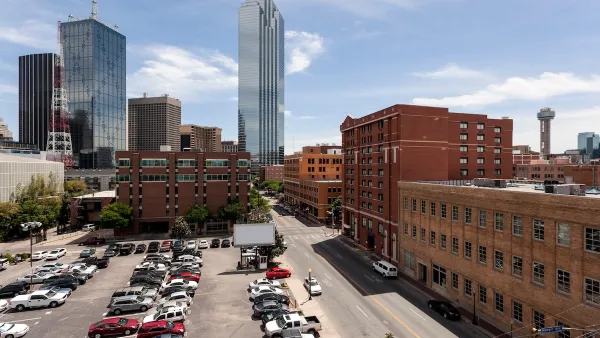City staff were asked to evaluate the potential for reducing parking and eliminating or altering minimum parking requirements.

A memo initially meant to support a PARK(ing) Day event in Dallas went further than expected when it “also called on Dallas City Manager T.C. Broadnax to reduce parking in the city, brief city officials on the status of that goal and look into the “elimination of minimum parking requirements in the city” — a major overhaul to the city’s decades old parking code.”
According to an article by Nathan Collins for KERA News, the memo, written by Council Member Chad West, was submitted in early August. Cities around the country are removing minimum parking requirements as part of their efforts to make housing more affordable and limit sprawl and the need for car use.
Collins notes that under the city’s current parking policy, developers are required to build an off-street parking spot for each bedroom in a residential unit, raising the cost of housing construction. “City staff also says the code poses a barrier to redevelopment of existing buildings, disproportionately burdens small business and could delay environmental and walkability goals the city has adopted.”
Some city councilmembers say their districts are ‘underparked,’ while others point to the many surface parking lots in the city that could be more efficiently used. Andreea Udrea, assistant director of the city’s planning and urban design department, said during a council briefing that the management of existing parking spaces is the city’s biggest problem. “The supply is not managed. Meaning, if it overspills, there’s no tools to deal with that, there’s no tools for design.”
Any proposed amendments to the zoning code will likely reach the City Council in late 2023 or early 2024.
FULL STORY: Elimination of minimum parking requirements' being discussed by Dallas officials

Montreal Mall to Become 6,000 Housing Units
Place Versailles will be transformed into a mixed-use complex over the next 25 years.

Planetizen Federal Action Tracker
A weekly monitor of how Trump’s orders and actions are impacting planners and planning in America.

DARTSpace Platform Streamlines Dallas TOD Application Process
The Dallas transit agency hopes a shorter permitting timeline will boost transit-oriented development around rail stations.

Study: 4% of Truckers Lack a Valid Commercial License
Over 56% of inspected trucks had other violations.

Chicago Judge Orders Thousands of Accessible Ped Signals
Only 3% of the city's crossing signals are currently accessible to blind pedestrians.

Philadelphia Swaps Car Lanes for Bikeways in Unanimous Vote
The project will transform one of the handful of streets responsible for 80% of the city’s major crashes.
Urban Design for Planners 1: Software Tools
This six-course series explores essential urban design concepts using open source software and equips planners with the tools they need to participate fully in the urban design process.
Planning for Universal Design
Learn the tools for implementing Universal Design in planning regulations.
City of Mt Shasta
City of Camden Redevelopment Agency
City of Astoria
Transportation Research & Education Center (TREC) at Portland State University
US High Speed Rail Association
City of Camden Redevelopment Agency
Municipality of Princeton (NJ)





























